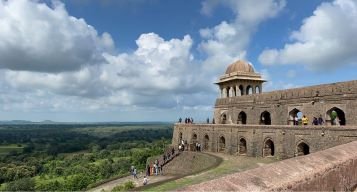Mailing List
Sign up for our mailing list to get latest updates and offers.
Madhya Pradesh boasts a rich tapestry of history and a legacy of diverse rulers that have shaped its cultural and political landscape. From ancient civilizations to medieval empires and colonial rule, the state's history is a fascinating journey through time. The history of Madhya Pradesh can be segmented into three main eras: ancient, medieval, and modern.
In ancient times, the region was under the influence of the Nanda, Maurya, and Gupta Empires. During the medieval era, Rajput clans such as the Paramara and Chandela rose to prominence, with the Chandela famous for building the Khajuraho temples. By the 14th century, the area was controlled by the Malwa Sultanate.
In the modern era, the region saw the dominance of the Mughal Empire, followed by the Maratha Empire, and eventually the British Empire. The princely states of Gwalior, Indore, and Bhopal were incorporated into what is now Madhya Pradesh. With India's independence in 1947, British rule ended. The state of Madhya Pradesh was officially established in 1956, and Chhattisgarh was separated from it in 2000.

The Bhimbetka caves in Madhya Pradesh show evidence of Paleolithic settlements, with Stone Age tools found along the Narmada river valley and cave paintings dating back to 30,000 BCE. Early human settlements primarily developed in the valleys of the Narmada, Chambal, and Betwa rivers. Chalcolithic sites of the Malwa culture have been discovered in places like Eran, Kayatha, Maheshwar, Nagda, and Navdatoli. During the early Vedic period, the Vindhya mountains marked the southern boundary of Indo-Aryan territory. The Rigveda does not mention the Narmada river, but later texts like those of Pāṇini and Buddhist works reference the region's significant janapadas and cities, including Avanti, Chedi, Vatsa, Ujjeni, Vedisa, and Mahissati.
Avanti was ruled by the Haihaya, Vitihotra, and Pradyota dynasties, becoming a major power under the Pradyotas before being annexed by Shishunaga into the Magadha empire.

During the 4th century BCE, the region came under the control of the Mauryan Empire, founded by Chandragupta Maurya and expanded by his grandson Ashoka the Great. Ashoka's reign marked a significant period in Indian history, with the spread of Buddhism and the establishment of a unified administrative system.Following the decline of the Mauryas, the Gupta Empire emerged in the 4th century CE. Often referred to as the Golden Age of India, the Gupta period saw advancements in science, mathematics, astronomy, and art. Ujjain, a prominent city in Madhya Pradesh, became a major center of learning and culture during this time.

After the fall of the Gupta Empire, Madhya Pradesh saw the rise of several regional kingdoms. The Parmar dynasty, with its capital at Dhar, was one of the most notable. King Bhoj, a legendary ruler from this dynasty, is remembered for his contributions to literature, architecture, and the arts. Another significant dynasty was the Chandela dynasty, known for constructing the magnificent Khajuraho temples, now a UNESCO World Heritage Site. These temples, built between the 10th and 12th centuries, are renowned for their intricate carvings and architectural brilliance.

The medieval period in Madhya Pradesh was marked by the rise of the Rajput clans, particularly the Tomars and the Bundelas. The Tomars established their rule in Gwalior, constructing the impressive Gwalior Fort, while the Bundelas ruled over the region of Orchha, leaving behind a legacy of stunning palaces and temples. The Malwa Sultanate, established in the 15th century with its capital at Mandu, also played a crucial role in the region's history. Mandu is famous for its architectural marvels, including the Jahaz Mahal, Hindola Mahal, and the romantic tale of Baz Bahadur and Rani Roopmati.

The Mughal Empire's expansion into central India in the 16th century brought Madhya Pradesh under its control. The region saw significant development during Akbar's reign, with the establishment of cities like Burhanpur as important administrative and military centers. The Mughals' architectural and cultural influence is evident in the numerous forts, palaces, and gardens they built.

In the 18th century, the Marathas gained prominence in Madhya Pradesh, with leaders like Ranoji Scindia and Ahilyabai Holkar leaving a lasting impact. Ahilyabai Holkar, the queen of the Malwa kingdom, is particularly revered for her administrative acumen and contributions to the development of Maheshwar and Indore. The 19th century saw the advent of British colonial rule. The British restructured the region, creating the Central Provinces and Berar, with Nagpur as its capital. This period also witnessed the rise of the Indian independence movement, with Madhya Pradesh playing a vital role in the struggle for freedom.
After India gained independence in 1947, the princely states and regions of Madhya Pradesh were reorganized. In 1956, the state boundaries were redrawn, and Madhya Pradesh was officially established with Bhopal as its capital. The state has since evolved into a vibrant and diverse entity, balancing modernization with the preservation of its rich cultural heritage. The history and rulers of Madhya Pradesh have left an indelible mark on the state's identity. From ancient empires to medieval kingdoms, Mughal influence, and British colonization, each era has contributed to the rich cultural mosaic that defines Madhya Pradesh today. As the state continues to progress, it remains a testament to India's enduring history and heritage.
Travelicious MP offers meticulously curated tours that showcase the rich cultural heritage, natural beauty, and historical marvels of Madhya Pradesh. With a focus on personalized experiences, our tours encompass everything from ancient temples and wildlife sanctuaries to vibrant local festivals and culinary delights. Each itinerary is designed to provide deep insights into the region's unique traditions and landscapes, ensuring an enriching and memorable journey for every traveler. With knowledgeable guides, comfortable accommodations, and seamless logistics, Travelicious MP guarantees an exceptional travel experience in the heart of India.